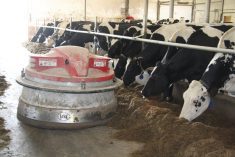A Manitoba pork producer has signed a deal that could see his nutritionally enhanced products on supermarket shelves and hotel menus in China.
Six months in the making, the agreement between Winnipeg-based Prairie Orchard Farms and China-Canada Super Food Co., Ltd., a newly formed division of a major real estate and land developer in China, will test the market for omega 3 and selenium enriched pork.
China is important to the functional food industry because of its 1.3 billion population and because the Chinese are among the highest per capita consumers of pork in the world.
Read Also

Manitoba extends Crown land rent freeze
Manitoba government links the continued rental rate freeze on grazing and forage leases to economic and environmental challenges facing the industry
“With the economy growing so rapidly in China, they feel that value-added food products are going to be the product in demand there,” said Prairie Orchard Farms president Willy Hoffmann.
“The Chinese have long used a lot of medicinal remedies from nature, and this kind of fits into that profile.”
Prairie Orchard Farms is the first company in North America to produce and market pork products nutritionally enhanced with omega 3 fatty acids. Its pork also contains selenium, which is said to strengthen the immune system and reduce cancer risk, heart disease and Alzheimer’s.
According to company literature, one serving of Prairie Orchard Farms pork supplies 50 to 60 percent of the recommended daily intake of selenium.
It has received approval from the Canadian Food Inspection Agency and the U.S. Department of Agriculture to label its pork as a source of omega 3 fatty acids.
China-Canada Super Foods is a division of Right Joint Real Estate Development Co. Ltd., which owns a number of prominent real estate properties in China.
Prairie Orchard Farms also hopes to place its products in Canadian supermarket chains starting this summer, but Hoffmann said it has been a tough sell so far.
“The groceries are looking at very specific markets that they want to get into, and organic is huge for them,” Hoffmann said.
“Even though they carry a lot of them, they don’t categorize them as functional foods.”
Functional food now on supermarket shelves includes omega 3 eggs and yogurt.
“They look at yogurts or omega 3 eggs as something with additional value. We’re trying to emphasize to them that there is another food group out there, and perhaps there’s an opportunity to market them as such.”
He said other obstacles include the lack of a grading system for pork similar to what’s used for beef. If consumers are under the impression that all pork is the same, it quickly becomes a commodity where the lowest price trumps all other considerations, he added.
With a USDA stamp of approval already on its omega 3 chicken, Prairie Orchard is working on receiving CFIA’s approval as well.
“Chicken has been looked at in a certain way in the past, but now you have a category of graded chicken that has functional food value,” he said.
Hoffmann said creating omega 3 meat is more complicated than simply feeding flax to livestock. Many companies in other countries, particularly Australia, have been trying to unravel the secret, with varying degrees of success.
Some attempts to create omega 3 pork faced problems with flavour, but Prairie Orchard’s technique of integrating the flax supplement in conjunction with the right feed mix has succeeded in creating a functional food with an improved taste.
“There are suggestions that it does have a different flavour,” he said. “Japanese consumers say that our pork tastes a little sweeter.”
Functional food is now a distinct category of food that is becoming better known worldwide.
Japan was the first country to embrace functional food, known as FOSHU in that country. It is now the fastest growing food segment in Japan.
Since 1991, FOSHU sales have been growing at an average of 25 percent a year.














